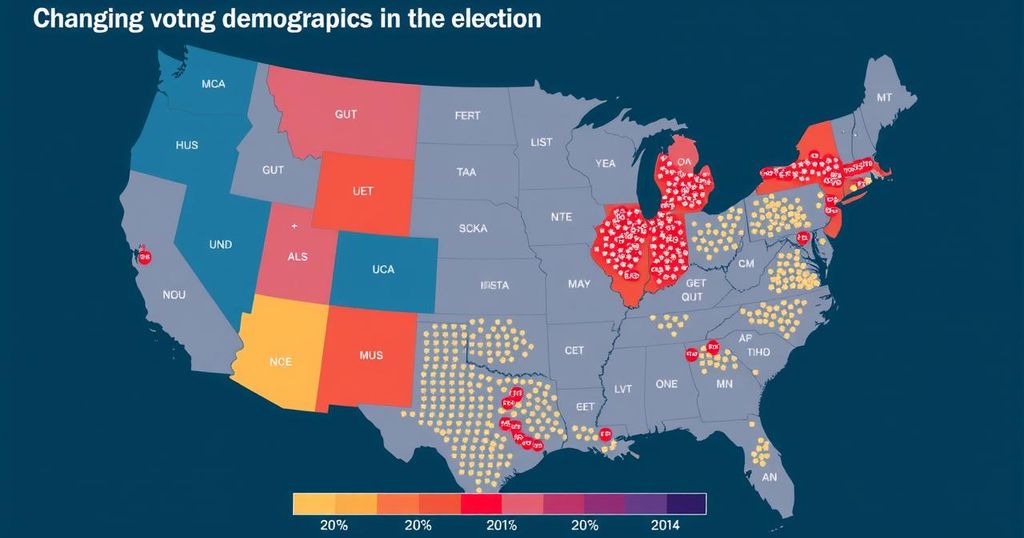Analyzing Gender Dynamics in the 2024 U.S. Election: Trump’s Male Support vs. Women’s Dissent

Donald Trump is experiencing a notable lead among male voters in the lead-up to the 2024 election, particularly with young men. Despite receiving significant backlash from women, stemming from his controversial remarks and actions, Trump maintains robust support from certain demographics of men. The election illustrates a stark gender gap, emphasizing shifting political alignments and the contrasting responses from male and female voters towards the candidates.
Recent polling data indicates that Donald Trump has established a significant lead over Kamala Harris among male voters, particularly with an 11-point advantage, as reported by a New York Times survey. While Trump’s primary base of support consists of white men, he has also seen increased backing from Hispanic and African American men, despite his controversial rhetoric towards these groups. Approximately half of Hispanic men perceive Trump as resolutely capable of fulfilling presidential duties. Trump’s endeavors to spread disinformation regarding Barack Obama’s legitimacy as president, alongside his defense of white supremacists’ actions during the Charlottesville protests, have seemingly failed to dissuade a notable contingent of young African American men from supporting him, with polls suggesting that about 25% of African American men under 50 years old intend to vote for Trump. A noteworthy subset of Trump’s support stems from young men, particularly those aged 18 to 29, many of whom identify more as Republicans or conservatives than in prior years. In a comparative analysis, young men’s political alignment has shifted to the right, while young women have become the most progressive demographic in American history. This widening political gap between young men and women has nearly doubled over the past quarter-century. Young men may be attracted to Trump’s persona, which challenges societal pressures that demand men to be more apologetic. According to a YouGov study, nearly two-thirds of American men feel that their representation and value in society need enhancement. Research suggests that many men who resonate with Trump struggle with societal expectations of masculinity, a phenomenon termed “fragile masculinity hypothesis.” This correlation between men’s struggles with identity and support for Trump has not been as evident in previous Republican candidates like Mitt Romney or John McCain. Trump’s masculine image is reinforced by his assertive and often locker-room-style rhetoric on the campaign trail, which has grown increasingly crude. His dismissal of prevailing political correctness post-MeToo, coupled with controversial statements regarding notable figures like Harvey Weinstein, has generated mixed reactions among different demographics of voters. However, many women, including white women who had previously supported Trump, have recoiled from his methods, particularly following his running mate J.D. Vance’s disparaging remarks towards women. A majority of women have been galvanized into action by Trump’s misogynistic language, as well as the repercussions of the Supreme Court’s decision to overturn Roe v. Wade, a ruling critical to women’s reproductive rights. Trump’s attempts to reposition himself as a protector of women and falsely claim to be the “father of IVF” appear to have only alienated many female voters further. In summary, while Trump garners significant support from men, his appeal among women, especially white women, has markedly diminished compared to earlier elections, indicating a complex landscape for the upcoming election.
The 2024 U.S. presidential election is presenting a unique dynamic, characterized by fluctuating voter demographics and ideological alignments. Historically, Trump has maintained strong backing from white male voters; however, recent trends reveal shifts in support levels amongst various groups. While polling illustrates a decline in support from women, particularly in light of recent social issues, men, especially younger demographics, are increasingly favoring Trump’s conservative leaning. This phenomenon invites analysis of underlying social pressures, identity issues, and the contrasting responses to each candidate’s messaging.
In conclusion, Donald Trump’s significant support among male voters, especially young men, presents a stark contrast to his plummeting appeal among women. The dynamics of voter sentiment suggest a critical election cycle where gender-related issues and the candidates’ communicative styles could significantly influence the outcome. While Trump capitalizes on traditional masculinity and anti-establishment attitudes, the growing mobilization of women in response to his rhetoric poses a formidable challenge. As the election approaches, it remains to be seen which candidate’s appeal will effectively galvanize their respective voter bases.
Original Source: theconversation.com







